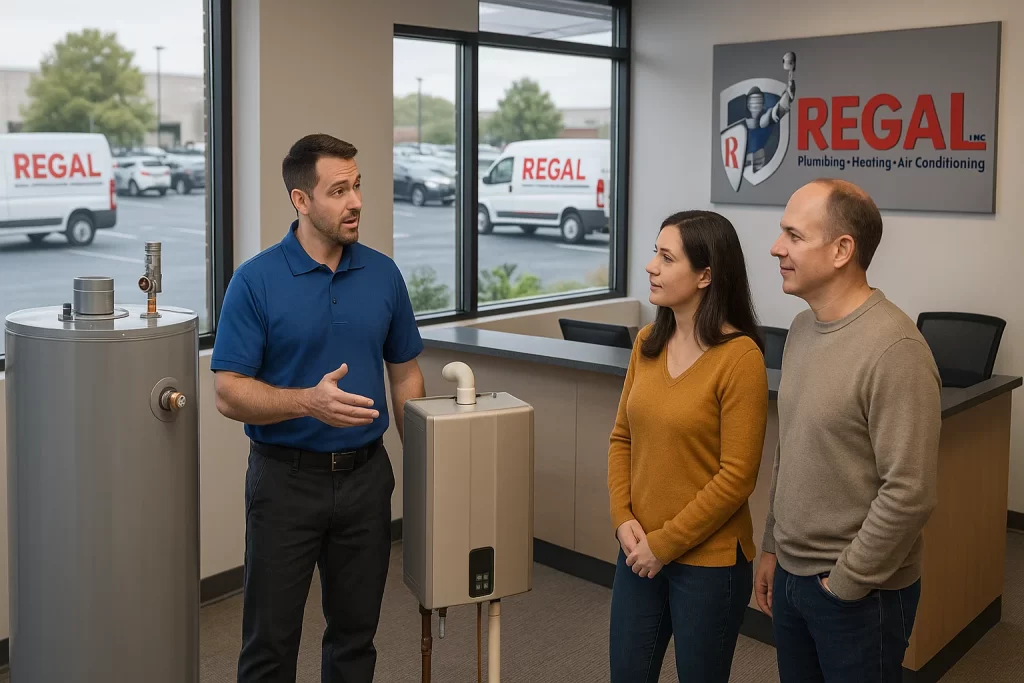When it’s time to replace your water heater, one of the biggest decisions you’ll face is choosing between a traditional tank water heater and a modern tankless water heater. Both types serve the same purpose—providing your home with hot water—but they do so in very different ways. Understanding the pros and cons of each can help you make the right choice based on your household’s needs, energy goals, and budget.

How They Work
Tank Water Heaters
These are the most common type found in homes. They store a large volume of hot water (typically 30-80 gallons) in an insulated tank. When hot water is used, cold water fills the tank and is heated until needed again. This means hot water is always available, but it also means the unit uses energy to keep water hot even when it’s not being used—a concept known as standby heat loss.
Tankless Water Heaters
Also known as on-demand water heaters, tankless models heat water only when you need it. When you turn on a hot water tap, cold water flows through a heating element (gas or electric) that instantly heats the water. There’s no storage tank, so energy isn’t wasted maintaining a reservoir of hot water.
Key Differences to Consider
1. Energy Efficiency
Tankless water heaters are generally more energy-efficient. According to the U.S. Department of Energy, homes that use 41 gallons or less of hot water daily can see 24–34% more energy savings with a tankless unit. Even in larger households, efficiency gains remain significant.
2. Hot Water Availability
With a traditional tank heater, once the hot water runs out, you’ll have to wait for the tank to refill and reheat. Tankless heaters, on the other hand, provide a continuous flow of hot water that is ideal for large families or back-to-back showers. However, they may struggle if multiple hot water demands happen simultaneously (e.g., shower, dishwasher, and laundry at once).
3. Installation and Space
Tank water heaters are bulky and require more space, usually installed in basements, garages, or utility closets. Tankless systems are compact and can be wall-mounted in tight spaces, freeing up valuable room.
4. Cost and Lifespan
Tank heaters generally have a lower upfront cost but a shorter lifespan of around 8-12 years. Tankless heaters can cost more to install (sometimes twice as much) but last 20 years or more, making them a smart long-term investment.
5. Maintenance Requirements
Both types require maintenance, but tankless units typically need annual descaling to remove mineral buildup, especially in areas with hard water. Traditional tank heaters may require flushing once a year to remove sediment from the bottom of the tank.
Why Professional Guidance Matters
Choosing the right water heater isn’t just about picking the most efficient model—it’s also about ensuring it’s properly sized and installed for your home’s specific demands. An undersized tankless heater won’t keep up with your usage, and an oversized tank system wastes energy. That’s why it’s important to have a licensed plumber assess your needs and help you make the best decision.
Need help choosing or installing your next water heater? Our team is here with expert guidance, professional installation, and long-lasting performance. Whether you go tank or tankless, we’ll ensure your home always has the hot water you need, exactly when you need it.
Contact Regal Plumbing, Heating and AC to schedule an appointment for water heater service. Committed to Service, Committed to You, Since 1974.
